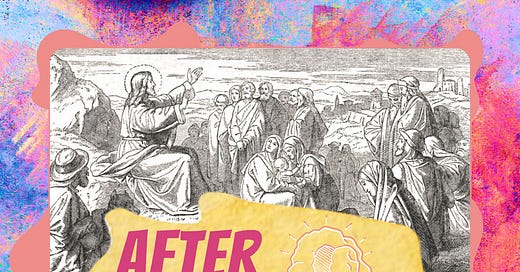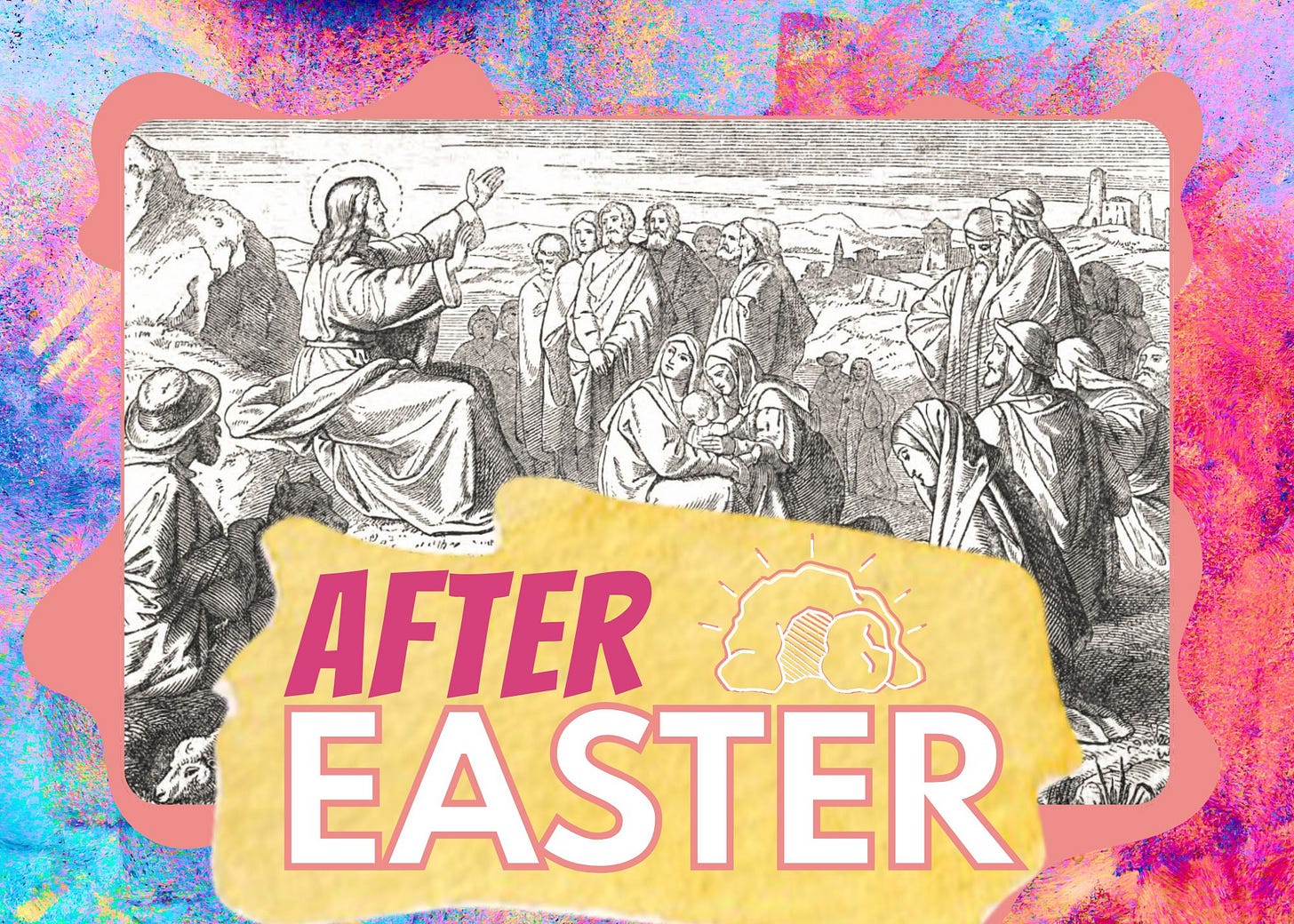|||| Passion Week has come to a close — Christ is risen from the dead! You’ve celebrated His triumph, sang all the songs, coordinated the bright colored outfits and brought your family along for Sunday worship services. But what now? How does the most miraculous day in history affect the rest of your regular, boring life? Every day this week, I’ll be giving a short encouragement on ways to epitomize the Resurrection and embody walking with Jesus. New life is just the beginning. There is so much more God has for you after Easter. ||||
1. Worthless Trash
Imposter syndrome is real.1
In virtually every industry and facet of society, people are walking around with a paralyzing fear. Stacked on top of so many other factors contributing to their anxieties, many are afraid they’ll one day be exposed: that people will finally find out they’re an “imposter,” incapable and unfit to handle their responsibilities or tasks for their position. The deeply entrenched worry itching in the back of their minds is what if. “What if people find out I’m actually unqualified?”
“Not good or talented enough?”
“A fraud?”
The U.S. is a fast-paced, production-oriented society where your resume is everything. What we’ve produced or accomplished vocationally is at the top of our priorities. However, this is not in line with a Biblical mindset of a life devoted to God. Paul regarded knowing Christ as the pinnacle accomplishment of his career:
7 But whatever things were gain to me, those things I have counted as loss for the sake of Christ. 8 More than that, I count all things to be loss in view of the surpassing value of knowing Christ Jesus my Lord, for whom I have suffered the loss of all things, and count them but rubbish so that I may gain Christ
— Philippians 3:7-8
A person with credentials and a professional record like Paul saying that is a pretty big deal. Additionally, he uses a pretty strong Greek idiom to describe his previous trophies with the word skubalon, used here for rubbish. Per Strong’s Lexicon: “In the Greco-Roman world, ‘skubalon’ would have been understood as refuse or excrement, something to be thrown away or avoided.”2 Essentially, Paul is glancing backwards and declaring that all the piles of accolades and flowers are in actuality different piles — piles of worthless trash.
Compared, that is, to knowing Christ Jesus.
2. Nightmare Fuel
Near the end of His Sermon on the Mount, Jesus makes a sobering statement about those looking to take their place in the New Creation:
21 Not everyone who says to Me, ‘Lord, Lord,’ will enter the kingdom of heaven, but he who does the will of My Father who is in heaven will enter. 22 Many will say to Me on that day, ‘Lord, Lord, did we not prophesy in Your name, and in Your name cast out demons, and in Your name perform many miracles?’ 23 And then I will declare to them, ‘I never knew you; depart from Me, you who practice lawlessness.’
— Matthew 7:21-23
For me? That’s terrifying.
How awful is it to think about living an entire life assuming you’re on good terms with God, only to come to the end of all things and realize far too late that Jesus doesn’t even know you? When Jesus says “I never knew you,” he uses the Greek word ginṓskō, which is more than just intellectual knowledge. This is rubber-meets-the-road intimacy. Understanding gained through sleepless nights and long conversations and time in the Scriptures and sacrifice and tears and difficulties and mountaintop moments and victories and miracle stories and a parade of other experiences in the spiritual life of a disciple. It’s relational knowledge of Jesus by you and of you by Him.3 But there will be some whom he looks to and says “We’re not like that. Go.”
Imagining that is the stuff of nightmares.
The real imposters are those who went to church every Easter Sunday thinking they and Jesus were cool when in fact, He didn’t know them at all. That’s the kicker: knowing Jesus is absolutely everything.
3. Right Where You Are
This all sounds good, but can we actually know Jesus? And even if so, how do we do that in our everyday world? Here’s a tidbit from philosopher Dallas Willard:
To know Christ in the modern world is to know him in your world now. To know him in your world now is to live interactively with him right where you are in your daily activities. This is the spiritual life in Christ.4
Knowing your Savior is more than just mental assent. It’s interacting with Him in the daily minutiae. Encountering Him in the Gospel accounts. Asking for Him to guide and direct you in prayer. Pouring out praise to Him and devoting your life to Him with a fountain of heartfelt words.
Your life’s chief goal should be to know Jesus Christ.
And you can only do that by letting Him in; living with Him every day. Your career won’t last in eternity. All your plaques and degrees and sales brokered and curriculum vitae and assets won’t survive the fire. Nothing on your resume will matter. Knowing Jesus every day is the only answer.
Yes, there are other people who know more Scripture.
And of course, some have been following Him longer than you.
Others are gifted or wise in areas you haven’t quote decoded yet.
But Christ longs to know you, friend. The Christian life is so much more than church attendance, niceties and crosses hanging on your walls. The Resurrection invites us into a living, breathing, New Humanity to inhabit by the power of the Holy Spirit that changes everything about how we live, and it all starts with Jesus. Having a nominal belief in Him is not enough: you have to know your Savior.
Put it into Practice:
Today, start reading about Jesus in one of the Gospels (Matthew, Mark, Luke or John). What stands out to you about Him? What surprises you?
Find a quiet place for 5 minutes; don’t bring your phone. Ask Jesus to reveal Himself to you in the stillness. Wait. Something noticeable may happen, or you may notice nothing. Something is happening within you just the same. It’s spiritual bootcamp.
Where can you serve someone this week? The heart of Jesus is often found with broken people. Make a plan to help others through your church, rescue mission or homeless shelter. You’ll find Him there.
Huecker, M. R., Shreffler, J., McKeny, P. T., & Davis, D. (2023, July 31). Imposter phenomenon. StatPearls - NCBI Bookshelf. https://www.ncbi.nlm.nih.gov/books/NBK585058/
Strong’s Greek: 4657. σκύβαλον (skubalon) -- Refuse, rubbish, dung, garbage. (n.d.). https://biblehub.com/greek/4657.htm
Strong’s Greek: 1097. γινώσκω (ginóskó) -- To know, to come to know, to recognize, to perceive. (n.d.). https://biblehub.com/greek/1097.htm
Willard, D. (2014). Knowing Christ today: Why We Can Trust Spiritual Knowledge. HarperOne. p. 139.







This is excellent! The process of knowing Jesus is truly the key. The turnaround for me was when, in frustration, I turned to Jesus in my mind and spoke out loud, "Jesus, I need to know you much better. I need to be able to talk with you, conversationally—You and me. Show me what to do. Make it real in my life, please. Thank you, Lord."
That was in the 90s, when I had already been a believer for twenty years. Now, after 50 years I can truly say that Jesus not only responded in power. He transformed my life even more. Alleluia! What a joy He is. And funny. >chuckle<
Such a helpful read POST EASTER. Great writing Kaleb!